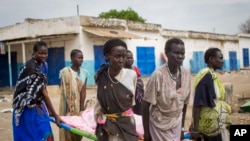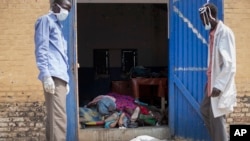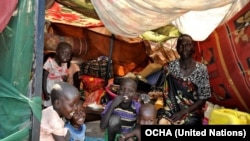JUBA —
South Sudanese opposition forces have pushed into the center of Malakal, the capital of the county's main oil producing state, and taken control of parts of the town after fresh fighting erupted there early Tuesday, officials told VOA.
“At the moment the force that attacked from the eastern part managed to have some pockets that penetrated into the center of the town," army spokesman Philip Aguer said, adding that the anti-govenrment forces had started the fighting by launching a three-pronged attack on Malakal.
The army, or SPLA, was in control of the southern and northern sectors of the town, Aguer said.
Although no casualty figures were available from the latest unrest in the town, global non-profit International Medical Corps said its personnel have treated more than 100 people wounded in the fighting.
The NGO's program manager in Malakal said the new fighting is causing tensions among civilians to spiral.
"Even inside the U.N. camp we have
seen tensions begin to rise and we have seen fights break out between groups within the IDP camps," she said in a statement.
The United Nations reported that some of the fighting in Malakal took place near the U.N. base in the town, where some 37,000 displaced people have sought shelter from fighting that first broke out in December. There were no immediate reports of casualties on the U.N. base.
Grace Cahill, the South Sudan spokeswoman for international aid organization, Oxfam, said the fighting in Malakal caused Oxfam to interrupt relief work at the U.N. base.
"We have to look for a way in the coming days that we can go back to work," Cahill said.
"All these incidents of fighting across the whole country make our humanitarian work incredibly difficult, and it has a huge impact on the displaced people that we are trying to help,” she said.
Thousands of people are believed to have been killed and some 870,000 others have been driven from their homes since fighting erupted in South Sudan.
As the capital of the state that produces around 85 percent of South Sudan's oil, Malakal has been a key battleground in the fighting that started in Juba in mid-December and quickly spread around the country.
Oil production has continued in Upper Nile during the conflict, but with production cut off in the other oil state, Unity, overall crude output in South Sudan has fallen.
The fighting in Malakal was the latest breach of a ceasefire agreed to at the end of last month. Fighting erupted near Malakal last week, just as pro- and anti-government sides were beginning a second round of peace talks in Addis Ababa. Aid groups have also reported heavy fighting in Unity state.
The government blamed those clashes and the latest unrest in the heart of Malakal on anti-government forces.
But just as he did last week, opposition spokesman Lul Ruai Koang laid the blame for the clashes with the government, saying opposition forces were merely defending themselves after the SPLA attacked their positions.
“We are not trying to regain control," Koang said.
"We had actually been in partial control of Malakal. What had been a problem was that they had been attacking us... harassing civilians and stealing their property and food," he said.
The fighting violates a cessation of hostilities agreement signed by both sides last month. It was not immediately clear if the latest clashes will impact the peace talks in Addis Ababa.
Aguer speculated that the opposition forces are getting help from an outside source that has been delivering supplies and munitions in rebel-held areas.
"After the SPLA controlled Gadiang (in Jonglei state), there was a lot of evidence that there has been a plane landing, plane dropping ammunitions. Whose plane, we don’t know. Where did they come from? We do not know. That is a subject of investigation," he said.
"The same thing when we captured Bentiu," in Unity state, Aguer added.
"There were six trucks that were loaded with food and ammunitions. Where did they come from? We do not know,” he said, giving no evidence to back up his allegations.
Presidential spokesman Ateny Wek Ateny speculated that a government that is angered by Uganda’s military involvement in the South Sudanese conflict could be providing the aid to the opposition forces, but did not name any specific government.
“At the moment the force that attacked from the eastern part managed to have some pockets that penetrated into the center of the town," army spokesman Philip Aguer said, adding that the anti-govenrment forces had started the fighting by launching a three-pronged attack on Malakal.
The army, or SPLA, was in control of the southern and northern sectors of the town, Aguer said.
Although no casualty figures were available from the latest unrest in the town, global non-profit International Medical Corps said its personnel have treated more than 100 people wounded in the fighting.
The NGO's program manager in Malakal said the new fighting is causing tensions among civilians to spiral.
"Even inside the U.N. camp we have
seen tensions begin to rise and we have seen fights break out between groups within the IDP camps," she said in a statement.
The United Nations reported that some of the fighting in Malakal took place near the U.N. base in the town, where some 37,000 displaced people have sought shelter from fighting that first broke out in December. There were no immediate reports of casualties on the U.N. base.
Grace Cahill, the South Sudan spokeswoman for international aid organization, Oxfam, said the fighting in Malakal caused Oxfam to interrupt relief work at the U.N. base.
"We have to look for a way in the coming days that we can go back to work," Cahill said.
"All these incidents of fighting across the whole country make our humanitarian work incredibly difficult, and it has a huge impact on the displaced people that we are trying to help,” she said.
Thousands of people are believed to have been killed and some 870,000 others have been driven from their homes since fighting erupted in South Sudan.
Not the first ceasefire breach
As the capital of the state that produces around 85 percent of South Sudan's oil, Malakal has been a key battleground in the fighting that started in Juba in mid-December and quickly spread around the country.
Oil production has continued in Upper Nile during the conflict, but with production cut off in the other oil state, Unity, overall crude output in South Sudan has fallen.
The fighting in Malakal was the latest breach of a ceasefire agreed to at the end of last month. Fighting erupted near Malakal last week, just as pro- and anti-government sides were beginning a second round of peace talks in Addis Ababa. Aid groups have also reported heavy fighting in Unity state.
Two sides swap blame for new clashes
The government blamed those clashes and the latest unrest in the heart of Malakal on anti-government forces.
But just as he did last week, opposition spokesman Lul Ruai Koang laid the blame for the clashes with the government, saying opposition forces were merely defending themselves after the SPLA attacked their positions.
“We are not trying to regain control," Koang said.
"We had actually been in partial control of Malakal. What had been a problem was that they had been attacking us... harassing civilians and stealing their property and food," he said.
The fighting violates a cessation of hostilities agreement signed by both sides last month. It was not immediately clear if the latest clashes will impact the peace talks in Addis Ababa.
Are rebels getting help?
Aguer speculated that the opposition forces are getting help from an outside source that has been delivering supplies and munitions in rebel-held areas.
"After the SPLA controlled Gadiang (in Jonglei state), there was a lot of evidence that there has been a plane landing, plane dropping ammunitions. Whose plane, we don’t know. Where did they come from? We do not know. That is a subject of investigation," he said.
"The same thing when we captured Bentiu," in Unity state, Aguer added.
"There were six trucks that were loaded with food and ammunitions. Where did they come from? We do not know,” he said, giving no evidence to back up his allegations.
Presidential spokesman Ateny Wek Ateny speculated that a government that is angered by Uganda’s military involvement in the South Sudanese conflict could be providing the aid to the opposition forces, but did not name any specific government.








